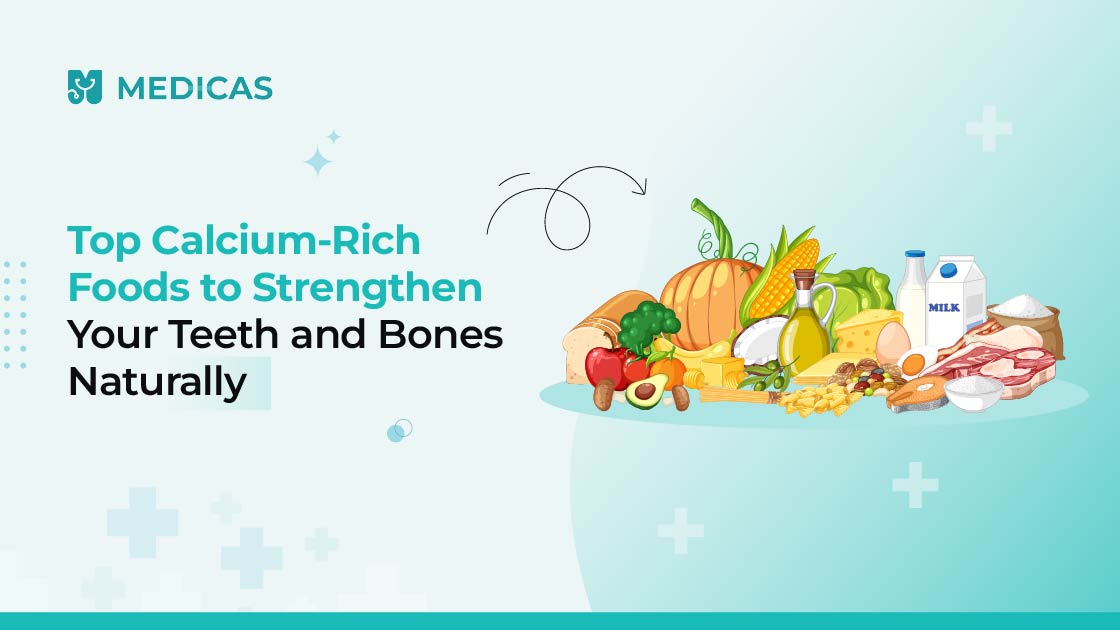Do you often wonder why your teeth feel sensitive or your joints ache despite a healthy lifestyle? One common reason behind these everyday complaints is a lack of calcium. Many don’t realise that poor calcium intake starts showing effects quietly over time. The good news? Simple diet changes can go a long way. This blog explains how and why calcium matters, along with the calcium-rich foods you can easily include in your meals.
Why Calcium Is Essential for Bone and Dental Health
Calcium, a vital mineral, is essential to numerous bodily functions, but its significance in bone and dental health is unparalleled.
How Calcium Helps Strengthen Teeth
Calcium for teeth is non-negotiable. Our teeth are composed of enamel, and calcium is the key mineral that supports the strength and durability of enamel. If calcium intake is low, enamel can wear down more quickly, increasing the risk of cavities, sensitivity, and gum issues. Adequate calcium helps maintain the jawbone, too, which holds the teeth firmly in place.
Importance of Calcium for Bone Density
Calcium for bones is just as critical. Over 99% of the calcium in the human body is stored in bones and teeth. A steady intake is crucial from childhood to ensure good bone growth, and it continues to be necessary in adulthood to prevent bone loss. Insufficient calcium intake can lead to brittle bones, osteoporosis, and an increased risk of fractures in later years.
Top 10 Calcium-Rich Foods You Should Include in Your Diet
Eating the right calcium-rich foods daily can help prevent long-term health problems in most cases, making supplements unnecessary.
Dairy-Based Calcium Sources
Dairy products are among the best calcium food options because the body easily absorbs the calcium they contain.
| Food Item | Serving | Calcium Content (approx.) |
| Plain yogurt | 1 cup | 415 mg |
| Milk (cow/buffalo) | 1 cup | 305 mg |
| Paneer | 100g | 227 mg |
| Cream Cheese | 1 slice | 97 mg |
Non-Dairy Calcium Sources
These natural sources of calcium are ideal for individuals with lactose intolerance or those who avoid dairy products.
| Food Item | Quantity | Calcium Content |
| Ragi (Finger Millet) | 100g | 344 mg |
| Almonds | 100g | 254 mg |
| Spinach, cooked (Palak) | 100g | 99 mg |
| Sesame Seeds (Til) | 1 tbsp | 87.8 mg |
Calcium-Rich Fruits and Legumes
These make great additions to everyday meals and help meet calcium requirements naturally.
| Food | Quantity | Approx. Calcium |
| Figs (dried) | 1 cup | 241 mg |
| Rajma (Kidney Beans) | 1 cup | 263 mg |
| Chickpeas (Chana) | 100g | 111 mg |
| Oranges | 1 cup | 71 mg |
Vegetarian and Dairy-Free Calcium-Rich Food Options
Adopting a vegetarian or vegan lifestyle doesn’t mean compromising on calcium intake. There are numerous vegetarian, calcium-rich foods to help ensure your bones and teeth remain strong.
Best Calcium Sources for Vegans
Vegans can confidently meet their calcium needs by focusing on plant-based alternatives.
- Fortified plant-based milk (soy, almond, oat): Look for brands with added calcium.
- Tofu (made with calcium salt): 861 mg per ½ cup serving
- Moringa leaves (drumstick leaves): 416 mg per 100g
- Bajra (pearl millet): 40 mg per 100g
How to Improve Calcium Levels Naturally
Beyond simply consuming calcium-rich foods, there are strategies to maximise absorption and ensure your body effectively utilises this vital mineral.
Pairing Foods for Better Absorption
Calcium doesn’t work alone. Certain vitamins and minerals help the body absorb and use calcium efficiently:
| Nutrient | Helps With | Food Sources |
| Vitamin D | Calcium absorption | Sunlight, mushrooms, fortified milk |
| Magnesium | Bone strength | Pumpkin seeds, whole grains, and banana |
| Vitamin K2 | Bone metabolism | Fermented foods like natto, curd |
When eating foods high in calcium, pair them with sources of vitamin D, Magnesium, and Vitamin K2 for optimal benefits.
Lifestyle Tips to Boost Calcium Intake
Beyond dietary adjustments, certain lifestyle choices can further support your calcium levels and overall bone health.
- Spend at least 20 minutes in sunlight daily to activate vitamin D.
- Reduce your intake of carbonated drinks and excess salt, as these can contribute to reduced calcium levels.
- Include small portions of calcium-rich foods in each meal rather than consuming a large quantity at once.
- Try home remedies like soaked sesame seeds or dry amla with jaggery.
- Keep roasted almonds or fig halves handy instead of processed snacks.
- Stay hydrated. Water is essential for all bodily functions, including the transport of minerals.
For a more personalised approach to your dietary needs and to explore the suitability of various supplements, an online doctor consultation can be highly beneficial. A healthcare professional can assess your requirements and provide tailored advice.
Final Thoughts
You don’t need to wait till symptoms appear to care for your bones and teeth. Start early and stay consistent with the right food habits. Incorporating a variety of foods into your daily routine that naturally support bone and tooth health can help prevent future health issues. In case of specific concerns or nutritional deficiencies, one can opt for an online doctor consultation to get a customised diet or treatment plan. Also, do not forget to book lab tests annually to monitor calcium, vitamin D, and bone markers, especially if you’re over 40 or have a family history of bone issues.
Frequently Asked Questions (FAQs)
- What are the best calcium-rich foods for bones?
Some of the best calcium food options include: Milk, curd, paneer, ragi, sesame seeds, moringa leaves, almonds, rajma, chickpeas. These help maintain bone strength and prevent long-term issues, such as osteoporosis.
- Can I strengthen my teeth by eating foods rich in calcium?
Yes. Calcium for teeth is essential. Regular intake of calcium supports enamel health, jawbone strength, and reduces the chances of gum problems.
- Are there any calcium-rich foods without dairy?
Absolutely. Ragi, almonds, sesame seeds, spinach, figs, rajma, tofu, and fortified plant milks are excellent sources of calcium without dairy.
- What foods help increase calcium absorption?
Vitamin D-rich foods like mushrooms and fortified milk improve calcium absorption. Avoid caffeine, excess salt, and carbonated drinks as they interfere with calcium.
- How can vegetarians get enough calcium naturally?
Vegetarian calcium-rich foods like leafy greens, legumes, nuts, seeds, ragi, and tofu can help meet daily needs. Fortified foods and sun exposure also support calcium levels.
Disclaimer
Medical Advice: The information provided in this blog post is for educational purposes only and should not be considered as a substitute for professional medical advice, diagnosis, or treatment. Always consult with a qualified healthcare professional for personalized guidance regarding your specific medical condition.
Accuracy of Information: While we strive to provide accurate and up-to-date information, the field of medicine and viral fevers is constantly evolving. The content in this blog post may not reflect the most current research or medical guidelines. Therefore, it is advisable to cross-check any information provided with reliable sources or consult a healthcare professional.
Individual Variations: The symptoms, causes, treatment options, and preventive measures discussed in this blog post are general in nature and may not apply to everyone. It is important to remember that each individual’s situation is unique, and personalized medical advice should be sought when making healthcare decisions.
External Links: This blog post may contain links to external websites or resources for additional information. However, we do not endorse or have control over the content of these third-party websites. Accessing these links is done at your own risk, and we are not responsible for any consequences or damages that may arise from visiting these external sources.
Results May Vary: The effectiveness of treatment options or preventive measures mentioned in this blog post may vary from person to person. What works for one individual may not work the same way for another. It is essential to consult with a healthcare professional for personalized advice tailored to your specific needs.

Dr. Aesha Bhatt is a dedicated General Physician with over 4 years of clinical experience in delivering comprehensive primary care. Based in Vadodara, Gujarat, she holds an MBBS degree and is registered with the Gujarat Medical Council. Dr. Bhatt is committed to providing holistic, evidence-based medical care, with a focus on managing common acute and chronic conditions. Known for her patient-first approach and strong diagnostic acumen, she is passionate about preventive healthcare, patient education, and building long-term trust with those she serves.


